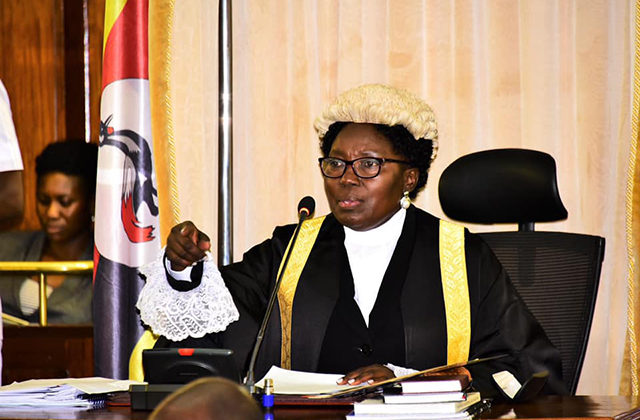
Rt Hon Rebecca Alitwala Kadaga, speaker of Ugandan Parliament. (courtesy photo.)
Members of Parliament have differing opinions on the proposal to have the application of the death penalty to the most serious crimes converted into life imprisonment.
This was noted during debate on the Law Revision (Penalties in Criminal Matters) Miscellaneous (Amendment) Bill, 2015 moved by Busiro East MP, Medard Ssegona.
The private member’s bill seeks to amend the Penal Code Act, the Anti-terrorism Act, 2002, the UPDF Act, 2005 and the Trial on Indictments Act to remove all references to the mandatory death penalty.
The bill also seeks to remove the restriction on mitigation in the case of convictions that carry a death penalty and to define life imprisonment or imprisonment for life.
The Legal and Parliamentary Affairs Committee in its report recommends that capital punishment should be the maximum sentence for extremely serious crimes including murder.
“It should be in the discretion of the Courts of Law to decide whether a conviction on the above crimes should deserve the maximum penalty of death or life imprisonment,” reads the report in part.
It also recommends that the subject of the death penalty ought to be regularly reviewed through national and public debate to discover whether public opinion on it has changed to abolition or not.
A section of MPs during the sitting on Wednesday, 14 August 2019 opposed the removal of the death penalty saying it would keep criminals at bay.
“I remembered how my senior colleague the late Hon. Abiriga was murdered. Why should his killers be given a lenient punishment if they are convicted with strong evidence? If we remove the death penalty, criminals will feel like they have got a leeway.” said Hon. James Waluswaka (NRM, Bunyole West County).
Ngora County MP, Hon. David Abala said the death penalty ought to be maintained and handed down to a criminal depending on the circumstances under which a crime was committed.
“Some people should not be left to go free because they deliberately committed the same crime over and over. We should not be lenient if we want to protect the lives of our people,” Abala said.
Some MPs, however, termed the death penalty as unconstitutional, saying that it would unjustly punish individuals who get convicted by court albeit being innocent of the crime.
“In this era where corruption is the order of the day, I fear that if we legislate this way, so many people will suffer when they are innocent,” said Hon. Santa Alum (UPC, Oyam).
Igara West MP, Hon. Raphael Magyezi, suggested that the options be explored to make the death penalty optional, in a bid to uphold the right to life, which he said should not be compromised.
“I want to challenge that statistics indicating that the death penalty deters crime are presented. This penalty should be removed because it puts a stain on the hand of the nation,” Magyezi said.
The Speaker, Rebecca Kadaga, observed that the trend of debate indicated that MPs needed more time to fully comprehend the bill.
“We have not come together on the intention of this bill. I want Members to refresh themselves with the amendments, and it is important that we internalize the six clauses,” Kadaga said.

